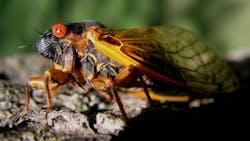GA Residents Making 9-1-1 Calls over Cicadas
By Bailey Aldridge
Source The News & Observer (Raleigh, N.C.)
Cicadas won't keep the noise down in Georgia — and residents are calling the police about it.
Multiple Union County residents have called 911 about "alarms" going off in the area, emergency officials wrote in a Facebook post Saturday. But the sounds they're hearing are likely coming from a noisy brood of cicadas that emerges every 17 years.
"More than likely these 'alarms' are not alarms at all but a bug, Brood X," officials said.
Brood X is starting to emerge from underground along the East Coast — including in multiple counties in northern Georgia, according to the Coastal Ecology Lab at the University of Georgia. More are expected in the coming weeks.
Brood X is the largest of the 17-year cicadas, according to the National Park Service.
Up to 1.5 million cicadas could emerge per acre where the brood resides, the lab says. And where they have emerged, they're making their presence known.
Male cicadas "produce the loudest sounds in the insect world," the NPS says
They do it to attract females, which then "indicate willingness to mate" by using their wings to make a clicking sound, the park service says. Each cicada species has its own "song," and they're often heard "singing together."
"It is often difficult to pinpoint where the sound is coming from and can sound like a vehicle or home alarm system," Union County officials said.
Residents are asked to "determine the location" before calling 911 if they hear what sounds like an alarm.
Once the cicadas emerge, they have four to six weeks to mate before they die, the Coastal Ecology Lab says.
The NPS expects Brood X to be gone by the end of June. But annual cicadas will stick around through August.
Cicadas don't bite or sting and aren't toxic to pets in "small amounts." But people with shellfish allergies may also be allergic to cicadas if they eat them.
"The massive number of periodical cicadas emerging can harm young trees because the females lay their eggs in young tree branches," the NPS says. "Spring 2021 is not a good time to plant small trees. Fall is a good time to plant trees this year or spring plantings can be protected with netting."
After Brood X leaves the East Coast this summer, it won't be back until 2038.
___
(c)2021 The News & Observer (Raleigh, N.C.)
Visit The News & Observer (Raleigh, N.C.) at www.newsobserver.com
Distributed by Tribune Content Agency, LLC.






